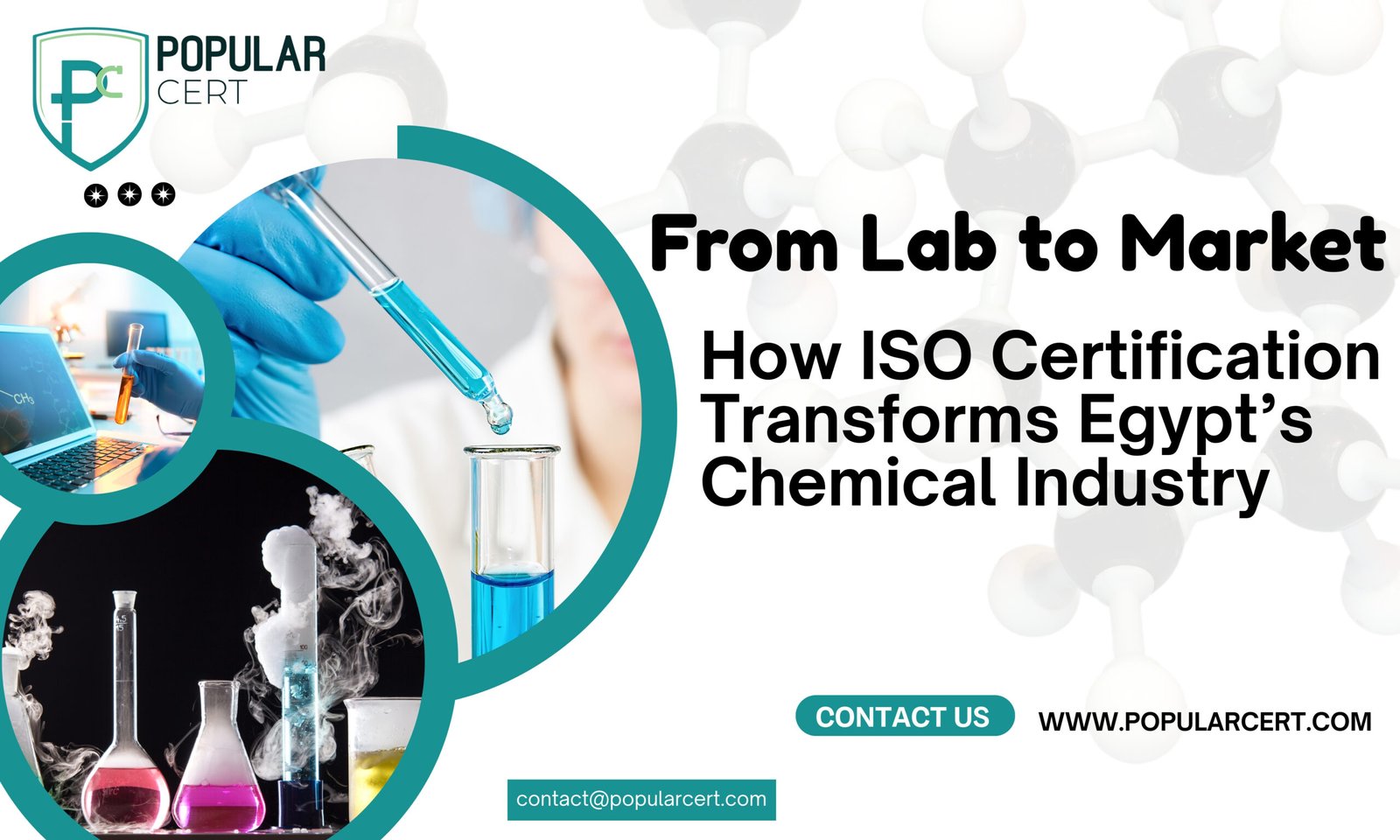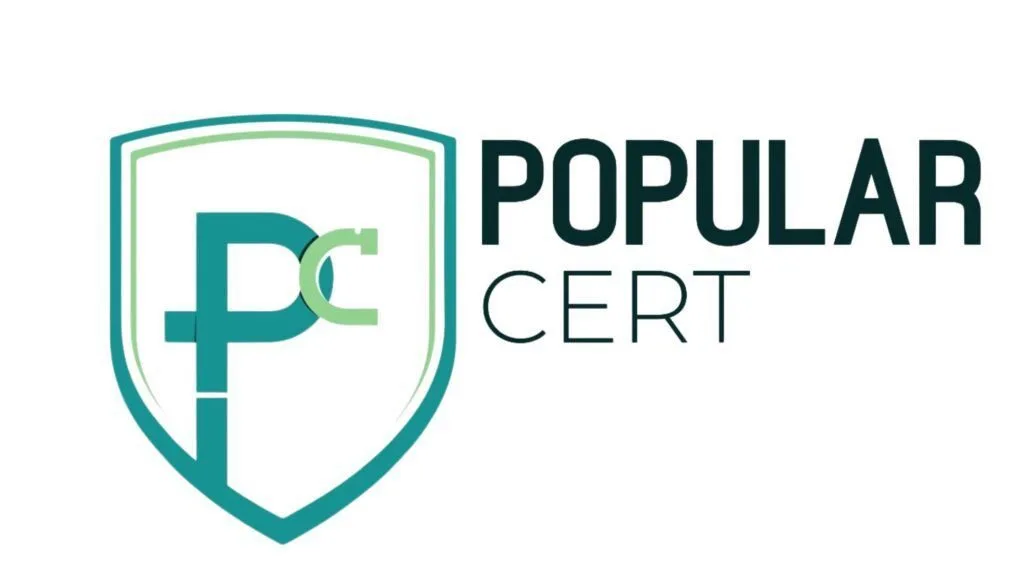From Lab to Market: How ISO Certification Transforms Egypt’s Chemical Industry

Envision a scientist in a lab in Cairo integrating compounds meticulously. She isn’t simply creating chemicals, she is molding the future of Egypt’s agriculture, healthcare, and even manufacturing. But her work extends far beyond the lab. To finally reach the shelves, a product needs to be safe, consistent, and of superior quality. This is where ISO certification comes into play.
ISO standards are changing the operational dynamics of Egypt’s chemical companies at all levels, in the prelim research stages through to commercial delivery. In this blog, we examine that journey and why we believe ISO is the silent cornerstone of trust, safety, and revered international acknowledgment.
Why ISO Certification Matters in the Chemical Industry
For Egyptians, the chemical Industry is more than just an area with compounds and chemical reactions. It is about attention to detail, safety and reliability, especially since the field serves Egypt’s construction, agriculture, textile, water treatment, and pharmaceutical industries.
Each and every chemical product, from a cleaning agent to an industrial solvent, has to go through elaborate safety assessment and quality control processes. Even the slightest error in formulation or packaging might lead to cape dangerous repercussions, product recall, health scaffolds, trade bans, etc.
This is where ISO certification becomes essential. It helps Egyptian chemical companies:
- Reduce risks
- Increase product reliability
- Meet global quality standards
- Increase export potential
- Boost customer and stakeholder confidence
Let’s take a deeper dive into how ISO certification works across every stage—from lab tests to market delivery.
Stage 1: Safe Science Starts in the Lab – ISO 45001 & ISO 14001
Within the laboratory scope starts with testing and building, but on every test there exists a prerequisite of laboratory safety and environmental care.
- ISO 45001 (Occupational Health & Safety) guarantees that laboratory aides perform their duties in a safe workstation. It imposes a guard against accidents and encourages safety culture.
- ISO 14001 (Environmental Management) assists labs in controlling the emission of chemical wastes and the pollutants released into the environment.
Here in Egypt, where there is stringent control in regard to the environment, ISO helps laboratories meet local requirements and international standards.
In essence, it can be stated that ISO standards safeguard humanity and nature from the initial stages of any research.
Types Of Certification
- ISO Certification
- ISO 9001 Certification
- ISO 14001 Certification
- ISO 45001 Certification
- ISO 22000 Certification
- ISO 27001 Certification
- ISO 17025 Certification
- ISO 13485 Certification
- ISO 20000-1 Certification
- ISO 22301 Certification
- ISO 50001 Certification
- ISO 37001 Certification
- IATF 16949 Certification
- ISO 29001 Certification
- ISO 31000 Certification
- ISO 20121 Certification
- ISO 10002 Certification
- ISO 41001 Certification
Get Free Consultation
Our Clients


















Stage 2: Quality in Every Formula – ISO 9001
Once the formulas have been established, production can begin in earnest. That is the main focus of ISO 9001 (Quality Management System).
Restructuring Egypt’s chemical industries faces many difficulties such as:
- Quality on batch production is not standardized
- Error in machine functioning
- Defects in raw materials
- Customer dissatisfaction
Help them identify issues ISO 90001 aids in process design reliability, establishing distinct qualitative measures, and rapid problem resolution.
It also ensures that the final product is always:
- Not dangerous to health
- Uniform as to laps of performance
- Identifiable from source to shelve
This means fewer product failures and more customer satisfaction, whether you’re selling locally or globally.
Stage 3: Packaging & Distribution – ISO 22000 & ISO 14001
When these chemicals are used in food, pharma, or personal care items, the importance of packaging and storage becomes even greater.
- ISO 22000 (Food Safety Management) applies to companies dealing in food grade chemicals or other food grade additives.
- ISO 14001 again plays a role here in making sure that packaging waste is handled responsibly.
Transport also adds another level. Transport of chemicals in bulk is usually done by truck, which needs definitive safe practices. ISO certified logistic contracts are most likely to follow these safety measures of eliminating leaks, fires, and dangerous contamination of the load while it’s being transported.
From factory floor to delivery truck, ISO keeps the product safe, traceable, and compliant.
Stage 4: Meeting Global Market Expectations – ISO Opens Export Doors
Egypt’s chemical exports are expanding. Everywhere from Europe, Asia, and even America, local producers wish to compete by exporting industrial solutions and fertilizers, Egypt’s Chemicals. However, ensuring successful trading goes beyond having a great product, businesses must prove its worth.
ISO certification provides that proof.
Chemical importing countries enforce strict outlines and checklists which require all products need quality assurance documentation prior to sending. These reasons explain why obtaining ISO certification is beneficial for Egyptian businesses:
- Gaining reliable trust from buyers
- Avoid customs rejections
- Obtaining international treaties and contracts
- Rival against international conglomerates
Think of ISO as your passport to global trade.
Real-Life Transformation: A Short Story
Consider a mid-sized chemical plant in Alexandria that produces cleaning agents. Exports to their neighbouring countries were dwindling, and there was an internal rise in complaints due to inconsistent batch production a few years back.
Then they got ISO 9001 and ISO 14001 certified with Popularcert’s help.
Here’s what changed:
- Major product returns decreased by 70%
- Employee safety metrics increased
- Energy and water consumption was reduced
- Two major export clients in Kenya and Jordan were acquired
This isn’t just a story, it’s what ISO does. It transforms the way businesses operate. It turns uncertainty into control, and local factories into global contenders.
The ISO Certification Journey in Egypt: Step-by-Step
ISO certification may appear to be a tedious undertaking, but at Popularcert, we specialize in streamlining the process, particularly for chemical firms in Egypt which place high importance on achieving compliance and maintaining safety, quality, and regulatory standards in their operations.
This is how the ISO certification process works stepwise:
1. Gap Analysis – Assess Existing Conditions
Our work begins with the review of your organization’s available systems, safety protocols, and documentation. This assessment enables us to determine what your processes ISO requires, or conform to, and what areas fall short. It’s like a health check-up for your business, identifying gaps so we can close them effectively.
2. Documentation & System Design – Develop the Management System
In this step, we assist in the designing of your ISO management system. This consists of formulating all relevant documents to be used such as safety procedures, quality control manuals, risk analysis documents, and environmental policies where applicable. These documents are the cornerstone of any operation, they become the reference point for day-to-day operations, audits, and continuous improvement.
3. Training – Prepare Your Team
A system is only as effective as the users behind it. For this reason, we train your team on ufollowsing the new systems in an ISO-compliant manner, correct procedure -through, and issue handling. Everyone is taught their primary functions which cultivates a sense of quality and safety within your organization.
4. Implementation – Put the Plan into Action
It’s time to put everything into practice. The ISO system goes live in your workplace, from production lines to quality control and document management. We continue this partnership by guiding you through this phase, answering questions, and ensuring the system operates effectively in your environment.
5. Internal Audit – Test Your Readiness
Before the official audit, we conduct an internal review. This mock audit helps you find and fix any weak spots in your system. Think of it as a final practice run—it boosts your confidence and reduces the chances of surprises during the actual assessment.
6. External Audit: Get Reviewed by Experts
An accredited ISO auditor comes to your site and evaluates if your systems fulfill all ISO requirements. He/She examines documentation, processes, employee awareness, health and safety compliance, etc. If all is well, you are set for certification.
7. Certification Issued: You’re Official!
Congratulations! Your firm gets an official ISO certificate once the auditor verifies compliance. With this certificate, your chemical company is internationally recognized for operating with safety, quality and professionalism. Clients, business partners and regulatory bodies trust your business more.
8. Ongoing Support: Stay Compliant and Grow
This is where the journey continues, toward a more robust and sustainable business. We assist you post-certification with surveillance audits, system updates, recertification, and continuous improvement strategies. These programs help you stay compliant, efficient, and competitive.
Why Popularcert is Egypt’s Trusted ISO Certification Partner
At Popularcert, we’ve supported countless chemical companies across Egypt, both large manufacturers and growing businesses, on their journey to ISO certification. What sets us apart is our deep local knowledge combined with international expertise. We understand the specific safety, quality, and regulatory challenges that Egypt’s chemical industry faces, and we align those with global ISO standards to deliver real results. Our process is completely hassle-free, we guide you through every step, from documentation to audits, without confusion or delays. Plus, our pricing is affordable and fully transparent, so there are no hidden fees or surprises. Every chemical operation is unique, which is why we don’t offer one-size-fits-all solutions. Instead, we tailor each ISO system to your specific workflow, processes, and goals. And our support doesn’t end at certification. We continue to stand by your side with updates, renewals, and improvement strategies, making sure your compliance evolves as your business grows.
GET A FREE CONSULTATION NOW
FAQ
Which ISO certification is best for chemical companies?
ISO 9001 (Quality), ISO 14001 (Environment), and ISO 45001 (Health & Safety) are essential. If you deal with food-related chemicals, ISO 22000 is also recommended.
How long does ISO certification take?
It depends on your company size, but with Popularcert, most clients are certified within 4–8 weeks.
Is ISO certification mandatory in Egypt?
Not always legally required, but many buyers, partners, and governments now demand it—especially for exports.
What’s the cost of ISO certification?
It varies, but Popularcert offers affordable, transparent packages designed for businesses of all sizes.
